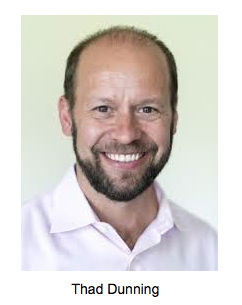How can leading thinkers in politics and economics effectively work together to promote development? What is required to implement and sustain effective policies in developing societies? What dilemmas do we face for creating and supporting new policies, and how can they be addressed through collaboration?
The UC Berkeley Center on the Politics of Development (CPD) gathers diverse scholars—both faculty and graduate students—who are grappling with pressing issues facing developing societies, largely focused on elections, governance, and related issues. “One of our main goals for the CPD is to further interdisciplinary collaborations around topics related to politics and governance in developing countries, and to create new initiatives that connect scholars working on these topics across the Berkeley campus and beyond,” explains Thad Dunning, Director of CPD, and Robson Professor of Political Science, whose research spans comparative politics, political economy, and research methods.
On the UC Berkeley campus, CPD (a Matrix-affiliated center) provides services and resources to assist faculty affiliates and research associates who are applying for funding opportunities, including research grants, dissertation awards, and fellowships. CPD partners with the Center for Effective Global Action, the Berkeley Center on Political Economy, and the Institute of International Studies to advance the study of politics and governance in lower-income societies, and also funds programmatic initiatives, hosts visiting speakers and conferences, and sponsors campus visits by leading scholars.
In addition, CPD is engaged in the Berkeley/Stanford Political Economy working group, a collaboration with Ken Scheve (Professor of Political Science at Stanford) that involves research presentations by advanced graduate students in both departments. “We would like to forge stronger ties across two great universities, Berkeley and Stanford, especially among scholars working on the political economy of development and related topics,” Dunning says. In recent years, CPD has launched initiatives in diverse areas, as profiled below.

Health and Governance Collaborative
The Health and Governance Collaborative is rooted in the idea that innovations in basic and clinical research in the health sciences often fail to reach many real-world populations in need. The Collaborative brings together researchers from political science, biostatistics, and medicine to focus on experiments in governance and global health delivery. Part of the purpose is to “scale up” to achieve desired health outcomes, based on understanding the behavior of governments, organizations, individual health workers, communities and individual patients in the context of health.
Co-housed at the CPD and the UCSF Division of HIV/AIDS, Infectious Disease, and Global Medicine, this initiative seeks to marry recent advances in implementation science (the study of methods to promote the integration of research into healthcare policy and practice), as well as methods of impact evaluation, to parallel social-science research on improving the quality of governance of healthcare in the developing world.
“Our motivation in launching this collaborative is to leverage insights from both biomedical and social sciences to advance delivery of global health, as well as improve the evidence informing care,” says Dunning. “We believe that both the health and social sciences can benefit from a cross-fertilization of ideas.”
In March 2015, the Collaborative hosted a Social Science Matrix prospecting seminar that included panel discussions on health sector reform and governance, and brought together researchers not just from UC Berkeley, but also UCLA and the London School of Hygiene & Tropical Medicine; researchers such as UCLA’s Daniel Posner, who spoke on “Community Monitoring and Health Outcomes in Uganda and Zambia,” and UC Berkeley’s Jennifer Bussell, who spoke on “Citizen Feedback Models and Health Center Reform in Telengana, India”.(Click here to see the full agenda.)
Experiments in Governance and Politics (EGAP)
The Center on the Politics of Development is also playing a central role in the Experiments in Governance and Politics Network (EGAP), which awards grants to innovative experimental research projects that seek to assess the role of information in fostering political accountability in developing countries. “Many scholars think improvements in the quality and nature of information that citizens hold about politicians and political processes can foster greater accountability,” says Dunning. “While there are several studies that test this proposition, results are mixed, and some of the difficulty in interpreting and summarizing past studies stems from core differences in the nature of the studies.”
As part of this work, the CPD is awarding grants for Metaketas (a word derived frrom “integrated research for knowledge accumulation”), projects that bring together teams of researchers who work on parallel projects around the world to develop generalizable answers to major questions of scholarly and policy importance. EGAP awarded seven grants last year, all for research projects focused on information and political accountability; the CPD received a $1.8 million grant. “Our goal in launching this initiative,” explains Jaclyn Leaver, CPD’s Program Director, “is to improve collaboration and coordination across research teams, while producing research that hews to the best standards of transparent social-science research.” (See here for further information about this initiative.)
Clientelism
Another important focus of the CPD is rooted in clientelism, the exchange of goods and services for political support. The Center has established a task force on political clientelism, focused on improving comparative understanding of clientelism, as well as developing innovative designs to assess causes and consequences. The CPD recently hosted a conference at Social Science Matrix called Brokering Votes: Clientelism in Comparative Perspective, which brought together emerging scholars working on clientelism and vote brokerage in different countries and contexts. The purpose, Dunning explains, was “to promote comparative understanding of clientelism and, especially, to highlight new research that assesses its causes and consequences.” Attendees included faculty and graduate students from UC Berkeley and other academic institutions.
Clientelism has long been a personal focus of Dunning’s; his book, Brokers, Voters, and Clientelism: The Puzzle of Distributive Politics (Cambridge University Press, 2013), examined the phenomenon of clientelism based upon evidence from Argentina, Venezuela, India, and Mexico. The book won the 2014 Luebbert Prize for best book in comparative politics and the Best Book Award of APSA’s Comparative Democratization Section. “I am building on my work on both political clientelism and ethnic politics to better understand the nature of transitions away from ‘vote brokerage,’ in particular, how policy interventions and decisions of political elites may shape the power of local brokers,” he says.
Electoral Violence
The CPD has recently launched an intiative focused on electoral violence, and organized a Social Science Matrix prospecting seminar that brought together researchers to explore the relationship between violence and democratic elections in developing countries. In addition to Dunning, participants in this initiative include UC Berkeley’s Leonardo Arriola, Associate Professor of Political Science; Aila Matanock, Assistant Professor of Political Science; and Manuela Travaglianti, Lecturer in Peace and Conflict Studies.
As the Center’s website explains, this initiative “seeks different means for measuring electoral violence and assessing whether violence complements or substitutes for non-violent electoral malpractices like fraud or vote-buying and whether these dynamics are different in post-conflict contexts compared to other contexts. It also considers interventions, by domestic and international actors, that attempt to change these dynamics.”
The collective impact of these initiatives will be not only to promote collaboration among researchers working in different domains, but also to promote greater understanding around the complex—and sometimes messy—processes that shape democracy, elections, and governance, and ultimately promote reforms and policies that could have a major impact in developing nations for decades to come.



